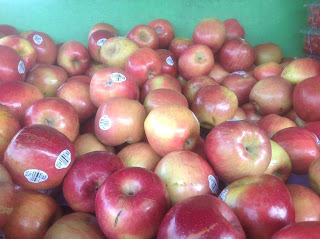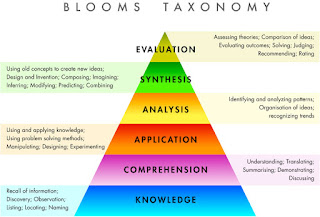As a teacher, I happen to love teaching my students how to think--creatively, uniquely, and from varying perspectives. Bloom's Taxonomy, a personal favorite reference point, is an organizational chart, sometimes depicted in the form of a pyramid, which denotes the various levels of thought: knowledge, comprehension, application, analysis, synthesis, evaluation.
One discovery I've made is that engaging students in
the writing process often triggers action at the top of the pyramid and
demonstrates the kind of thinkers individuals are becoming. Writing draws from the lower parts of the
pyramid and provides a handy evaluation tool to note what concepts a student
grasps and which ones need further review.
But what does Bloom’s Taxonomy have to do with the Christian
life? In considering the way I have
observed Christianity, I was wondering the other day if it’s not a bit like
Bloom’s levels. Spend a lot of time developing Knowledge (that’s good—we know, because 2 Peter 1 says we are to “add…knowledge.” Read the Word. Go to church.
Learn much of Christ. This stage
is valuable (and cyclical, as it occurs daily). Indeed, without knowledge of
the Scriptures, we will be ill-equipped to function in the Christian life, for we will not know the mind of God concerning truth.
Knowing the Scripture is not enough, however: it needs to be
comprehended. For instance,
understanding that vision can refer
to the Word of God, as in 1Samuel 3:1— “And the child Samuel ministered unto
the LORD before Eli. And the word of the LORD was precious in those days; there
was no open vision” is a valuable bit of comprehension of the language of the
King James Bible. Thus, verses like Proverbs 29:18, “Where there is no vision, the people perish: but he that
keepeth the law, happy is he” reach
very different conclusions than if the word
vision is comprehended in the way individuals use the term today.
But application—where the message
hits home, the rubber meets the road, where knowledge must be lived out in
life—proves an even higher order Christian living skill. It means taking that message we heard Sunday
and walking in its truth. It’s knowing
that we should meditate on Scripture all day long and
then actually doing it.
Analysis, of course, is the
dissecting into parts, the taking of words of Scripture and studying them out, of deeply working through questions about
Synthesis includes walking with Jesus all the time.
But synthesis is how it all works
together. Like all the time. Like every single minute of the day. It is an actual living out the Gospel every
minute, walking with Jesus 24/7, and watching His Spirit produce His fruit in
our lives. Every Christian can be
here. We can all be synthesizing the
sounds of the Christian experience and living in the beauty of Jesus (Psalm
27:4), but I wonder how many of us actually do that. For myself, synthesis has, for many years,
been a strong desire. It’s been a
longing of my heart to live out every biblical truth I know, but I too often have found myself
unable to perceive the proper balance of truth in every situation of life. The synthesis, that beautiful harmony and
orchestral symphonic production of just the right mixture of God in my life,
can get lost as I chase after the truth I learned Sunday but forgot the one I
learned three months before. So, in my
experiential evaluation, what am I seeing as the key to synthesis in the
Christian life?
Prayer.
Yes, prayer.
In his Systematic Theology, Wilhelm a Brackel speaks of this very attribute. He writes, "Have
and maintain a soul which is pure and undefiled, fully devoted to God, and finds
her existence in communion with God." He illustrates such a spirit in the person of Nehemiah, who was able to to speak with men while simultaneously praying
to God:
"Then the king said unto me, For
what dost thou make request? So I prayed
to the God of heaven. And I said unto the king, If it
please the king, and if thy servant have found
favour in thy sight, that thou wouldest send me unto Judah, unto the city
of my fathers’ sepulchres, that I may build it" (Neh. 2:4-5).
When I started this year, I
committed to pray at a deeper level than I ever had before. A number of various influences in my life
encouraged it, and I decided to go with it.
As I reflect upon that one decision, I praise God for giving me a small glimpse into the incredible significance and necessity of prayer in a believer's life.
You know Philippians 4:6—“Be careful for nothing; but in every thing
by prayer and supplication with thanksgiving let your requests be made known
unto God”? I knew it said
“everything.” But it’s true. It really means everything.
In pursuing prayer, I’ve seen even more clearly a life lesson that God has taught me many times throughout the years--how completely dependent
I am upon God for everything.
Literally. Without Him I can do
nothing--NO THING. And it seems to me that no thing can be
synthesized, lived out in the right way in the Christian life, without all prayer.
So now how does life look for
me? Far different than I ever thought it
would. Back in January, my prayers were
fervent, but the Lord has continued to reveal aspects in my spirit that need replacement with the Spirit of Christ.
Taking the advice of a book on prayer, I began writing out prayers rooted
in Scripture.
“Create in me a clean heart, O
God, and renew a right spirit within me” become a regular request in my life. One area that God has shaped my spirit has been in my response to the sins of other about me. The sins of others often shot fiery wounds into my own spirit, and the peace of God, which I
knew could “keep my heart and mind”—too easily stole away from my heart as these conflicts seemed like mountains to be claimed in
prayer.
However, God has graciously made me aware that His plan is that I pray about everything with thanksgiving. If that praise is missing with every request, then my own spirit can become negatively affected and my goal, God's glory, will not be realized by others about me, who will not perceive in me the praiseworthy God I serve.
Other challenges presented themselves. I struggled knowing how to deal with critical words from others. Truth does not reside in what people say or think, because they can misread situations. But if others saw something in me (accurately or not), I wanted respond biblically. How could I know when people were right and how could I best respond to their words?
How I needed God’s wisdom
in sorting this out! Situations such as these were not ways I had envisioned God answering prayers.
In fact, it seemed the more I prayed, the more prayer was making my life a challenge. But I knew God was good and I could not stop praying. Even when I saw individuals departing from God, dear ones for whom I had prayed, I knew God heard my prayers, for the saints in
Revelation attest to that truth.
Then I heard a message dealing
with another upper level of Bloom’s Taxonomy (not called that, of course): evaluation.
How do I evaluate my Christian life?
What is the litmus test of my Christianity? What is the canon, the measuring stick, the
rule by which my Christianity will be judged?
Simply put, it’s fruit.
Now I’ve heard preachers talk
about all the souls that will be saved if we are right with God. But when my brother Josh preached a message
on spiritual fruit, he noted that the fruit which is 100-fold, 60-fold, or 30-fold
is fruit of God's Spirit of righteousness. He traced the
fruit texts in Scripture dealing with the idea of fruit—John 15, Galatians
5:22-23, James 3:18, and others. Of course, it can
include the fruit of souls. But if we’re
going around evaluating how many souls have come into the kingdom because of
our witness, we might get pretty bent out of shape, since we don’t actually
know that anyway. (One plants; one
waters; God gives the increase.)
 |
| Fruit: the evaluative stage of our Christian experience |
That message greatly helped me
develop the right kind of evaluation of my Christian life. The Christian life, I knew, is about what God
thinks of me. But it’s also about how
much fruit of the Spirit I’m producing. Who doesn't long to be a 100-fold Christian? Someone who bears spiritual fruit continually? And yet, I was reminded, that fruit will not be fruit sourced in us. It will be entirely from Him. What’s more, any lack in me is an
evidence, not necessarily of something I need to change, but another way I can
totally and completely depend upon Him! As I applied this message to my need to depend on God for the fruits of the Spirit, the Lord began to teach some valuable lessons.
In synthesizing what fruit looks like, I've come to realize that dependence on the
Spirit for His fruit production happens multiple times in a day. At some point during a busy day, I will come to the end of “my” love and every other spiritual fruit. But the Spirit is never depleted of His love, joy, peace, longsuffering, etc.! While I desire to do right all the time and manifest God's fruits continually, such a life is impossible without continual dependence upon the Spirit’s help. Daily.
Moment by moment. Because God is
the Source of our being--not only of our
every physical breath, but in our every spiritual breath, as well!
It seems to me that this weapon of "all prayer" hinges the armor of the saint. Prayer is crystalizing knowledge for me and further clarifying God’s definitions of things. Because God's Spirit produces peace, confusion need have little, if any, place in our Christian experience as believers
depend on the Holy Spirit for everything and walk confidently, looking in faith
to Jesus.
Now nearing the end of this year,
I look back at the sweet moments of prayer friendships that have developed with others, including a
dear godly woman whom I call regularly to share in moments with our Master in
prayer, laying everything in the lap of the Savior while claiming His promises
to hear and answer. The incredible
freedom of spirit that emerges from such sweet times has been
revitalizing! Various messages on prayer
have likewise bolstered the seed that began to grow
in my heart last January. A detailed
study of the Lord’s Prayer has provided a road map for meeting God in prayer. Opening the Psalms or other
Scripture prayers to pray God’s thoughts after Him for a particular situation has proved a special encouragement as I reflect on the eternal words from our
Lord.
Some might call certain events mere coincidences--like "running into" the same individual twice in one day-- but I’m seeing those encounters as God’s call to prayer for that one, to lift up that person before the throne of grace. And watching specific answers to prayer
happen in the lives of people I love is yet another beautiful evidence that God
is real, that prayer works, and that I am incredibly dependent upon the Lord
for anything and everything that happens in life.
What a journey it has been so far! And, by God's grace, I anticipate continuing it every day of
2017.
In prayer.
With thanksgiving.


Comments